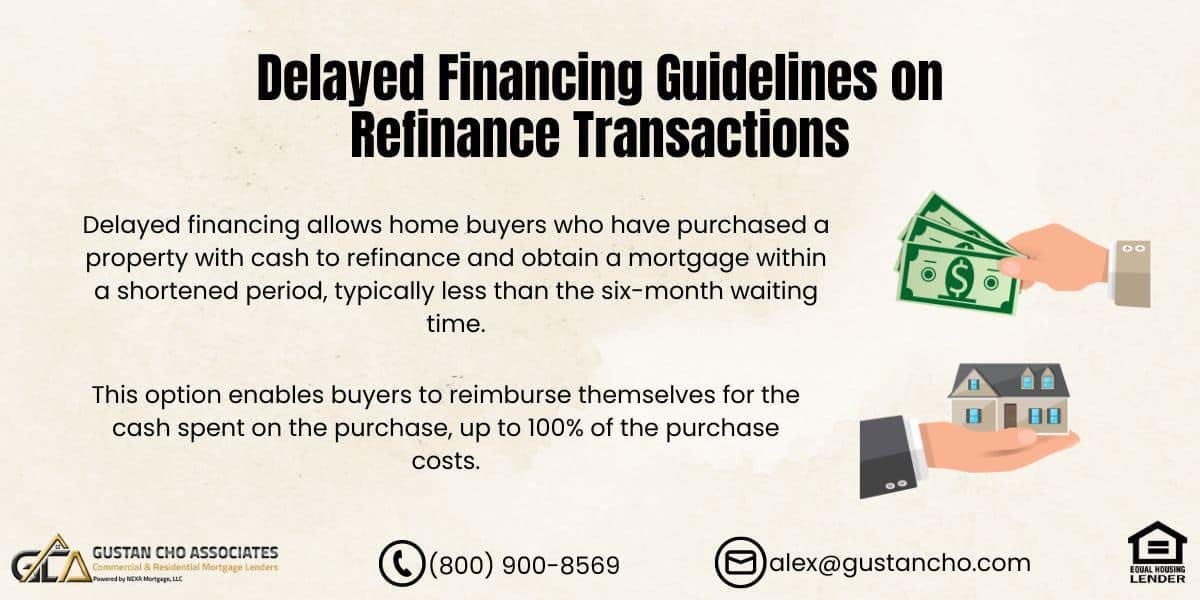In this article, we will cover and discuss delayed financing guidelines on refinance transactions. Delayed Financing Guidelines apply for homebuyers who purchased home cash and are needing to do a cash-out refinance. Sellers often prefer cash home buyers. The housing market has been hot for the past few years.
Bidding wars are often common. Cash buyers with no contingencies often get the winning bid in a home bidding war. Home prices have been rising throughout the United States. Due to rising home prices, both the FHFA and HUD have increased loan limits for the past six years.
What Is Delayed Financing
Fannie Mae and Freddie Mac set up Delayed Financing Guidelines for home buyers buying property cash to be able to refinance a home in less than the 6 months waiting period required.
Conventional loan delayed financing exception allows property owners to do a cash-out refinance prior to waiting the six months required. In 2011, Fannie Mae set up Delayed Financing Guidelines that enable home buyers who purchase property cash to reimburse themselves up to 100% of their home purchase costs with conventional loans.
Qualifying For Delayed Financing
Delayed Financing Guidelines state that the home purchase transaction needs to have been an arms-length transaction. What this means is that the home buyer cannot be purchasing the home from a family member and/or have a non-arms-length home purchase transaction.
The types of properties that qualify are owner-occupant primary homes, second homes, and investment properties. Certain trusts, Limited Liability Companies, and partnerships may qualify and be eligible.
Property owners cannot have any liens by a lender such as a cash-out mortgage, HELOC, and/or other liens on the property. Proof that the property has no other liens needs to be provided. Lenders will run a nationwide third-party public record search to confirm. Documentation on how the home buyer purchased the home will be required.
Paid Cash for a Home? Get Your Money Back Fast With Delayed Financing
Use delayed financing to pull equity out immediately—no 6-month wait required! See If You Qualify for Delayed Financing Today!
Waiting Period on Delayed Financing on Conventional Loans
Delayed Financing Guidelines on cash-out refinance mortgages apply for owner-occupant, second homes, and investment properties. Fannie Mae Guidelines on cash-out refinance mortgages require a six-month waiting period from the date of the initial home purchase.
With Fannie Mae Delayed Financing Guidelines, the six-month waiting period requirement on cash-out refinance mortgages on conventional loans is waived.
This holds true if the buyers did not open up any other loans since the home purchase. This is called the Delayed Financing Exception which means it is an exception to the cash-out refinance guidelines. If a home buyer has owned the property for six months or longer, Delayed Financing Exceptions do not apply.
Freddie Mac Delayed Financing Guidelines
Being on a title for the past six months is required when it comes to cash-out refinance mortgage guidelines. There are exceptions to this rule:
- The property was inherited
- The property was legally awarded to the current property owner
- No financing was used to acquire the property
- The property needs to be lien-free
- Original documents from home purchase closing
Delayed Financing Guidelines By FNMA On Refinancing
There are times when a home buyer or real estate investor will purchase a home with cash with the intention of doing a cash-out refinance mortgage at a later time. There are Delayed Financing Mortgage Guidelines these types of home buyers need to abide by.
There are many reasons why a home buyer will purchase a home in cash. The home seller may prefer selling their property to a cash buyer with no mortgage contingency where it is a hot property. Or the property may not qualify for a conforming loan due to repairs needed and/or the property not being habitable. Sellers may only take a fast closing purchase offer.
In this article, we will discuss and cover Delayed Financing Mortgage Guidelines By FNMA On Refinancing.
Fannie Mae Delayed Financing Guidelines
Foreclosures and REO properties oftentimes need a lot of work. Often times foreclosures and REO properties are not habitable and need renovations. Unhabitable properties are difficult to get mortgage financing. Homebuyers and investors oftentimes need to purchase it with cash or non-traditional means such as hard money loans.
With the delayed financing mortgage loan program, a home buyer can purchase a home in cash. Make the home habitable or mortgageable. Do a cash-out refinance mortgage loan prior to the six months mandatory traditional waiting period to do a cash-out refinance.
Delayed Financing Guidelines on Refinancing Home After Buying Cash
Any qualified borrower can do a delayed financing mortgage loan as soon as he or she closes on their home purchase. The cash used for the home purchase needs to be documented and sourced. The new mortgage loan cannot be greater than the actual purchase price of the subject property.
Rehab money invested in the subject property cannot be cashed out. Only the original purchase price can. The purchase transaction of the property needs to be an arms-length transaction and cannot be a family member selling it to another family member. Maximum loan to value on delayed financing cash-out refinance mortgage loans are capped at 70% LTV.
Any residential properties with up to 4 units will qualify. Second homes and investment homes may also qualify for delayed financing mortgage loan programs.
Cash-Out Refinancing Waiting Period Guidelines
Many homebuyers assumed that they can easily do a cash-out refinance mortgage loan right after purchasing home cash. Unfortunately, due to the real estate, credit, and banking collapse of 2008, there are new rules and regulations when it comes to cash-out refinance mortgage loans.
New Delayed Financing Guidelines were implemented. To do a cash-out refinance mortgage with a conventional loan program, borrowers need to wait six months. However, there is an exception to this rule. Fannie Mae will allow an exception to do a cash-out refinance mortgage loan under six months via Delayed Financing Guidelines.
Homebuyers can now purchase home cash and do a cash-out refinance mortgage loan the next day through the Delayed Financing mortgage loan program.
What is an Example of Delayed Financing?
Here’s a practical example of how delayed financing might work in a real estate scenario:
Example: Real Estate Investor Buys a House with Cash
Situation: a real estate investor, Jane finds a property listed for sale at $300,000. The property is in a competitive market where cash offers are favored due to their quick closing ability. Jane decides to purchase the property with cash to ensure her offer is competitive and to expedite the closing process.
Step 1: Cash Purchase
- Purchase Price: $300,000
- Jane uses her savings to purchase the property outright, avoiding financing delays and making her offer more appealing to the seller.
Step 2: Applying for Delayed Financing
- Jane applies for delayed financing within a few weeks of purchasing the property.
- She submits all necessary documentation, including proof of the cash purchase (e.g., bank statements and HUD-1 settlement statements).
Step 3: Refinance Details
- Appraisal: The property was appraised for $320,000.
- Loan Amount: Jane applies for a cash-out refinance. According to the delayed financing rules, she can refinance up to the lesser of the purchase price or the appraised value, plus closing costs. She opts to refinance the full $300,000 that she initially paid.
Step 4: Receiving the Loan
- The refinance is approved, and Jane receives $300,000.
- She uses this amount to replenish the cash she originally used to purchase the property.
Outcome: Jane now owns a property valued at $320,000, has her initial cash investment back in her bank account, and holds a mortgage. She plans to rent the house, generating rental income while holding a leveraged investment.
This strategy allows investors like Jane to make competitive offers in hot markets and quickly recoup their cash, making it available for further investments or other uses. It’s a valuable technique for maintaining liquidity while engaging in real estate transactions.
Can You Refinance if You Have Late Payments?
Yes, you can refinance a loan even if you have late payments in your credit history. Still, it can be more challenging and result in less favorable terms. Here’s how it typically works:
- Credit Impact: Delayed payments can adversely impact your credit score, which is a critical aspect that lenders consider while assessing your refinance request. A reduced score may result in increased interest rates or even the rejection of your application.
- Lender Assessment: Lenders will review your overall financial situation, not just your credit score. This includes your income, employment stability, debt-to-income ratio, and home equity or other collateral equity.
- Explanation and Documentation: Providing a reasonable explanation for any late payments along with documentation can help. For instance, lenders might be more understanding if the late payments were due to temporary hardship like medical issues or job loss, and you’ve since recovered.
- Improving Your Chances: To increase your chances of approval, wait until your recent credit history shows consistent, on-time payments. Lowering your debt-to-income ratio can also improve other aspects of your financial profile.
- Special Programs: Some lenders or government programs might offer refinancing options designed for people with less-than-perfect credit. It’s worth researching these options or discussing them with a financial advisor.
Enhancing your credit score is important before refinancing. A financial advisor or mortgage broker can assist you in preparing your application.
What is the 90 Day Rule for Delayed Financing?
The 90-day rule for delayed financing refers to a guideline set by Fannie Mae, which is part of a broader category known as “Delayed Financing Exception.” This rule allows a borrower to obtain a cash-out refinance shortly after purchasing a property in cash, without the usual six-month waiting period typically required by most lenders.
Here’s how it generally works:
- Purchase in Cash: The borrower purchases a property using cash without financing.
- Refinance Within 90 Days: The borrower can apply for a cash-out refinance within 90 days of the purchase.
- Loan Amount: The new loan amount can be up to the lesser of the original purchase price or the current appraised value, plus closing costs, prepaid fees, and points.
- Documentation: The borrower must provide proof of the cash purchase, such as settlement statements and the funds’ source.
- Purpose: This exception is typically used by real estate investors who wish to free up the cash they invested in a property for further investments or by buyers who initially purchase with cash to make their offer more appealing and then seek to regain liquidity.
The rule is particularly useful in competitive real estate markets where buyers may purchase properties with cash to strengthen their offers and later obtain financing to replenish their liquidity. It’s also beneficial for investors who may need to act quickly to secure properties.
Bought With Cash? Refinance Right Away With Delayed Financing Rules
No need to wait to tap into your equity.
What is an Arrangement for Delayed Payment of a Loan or Purchase?
An arrangement for delayed payment of a loan or purchase allows the payment to be postponed later. Here are common types of such arrangements:
- Deferred Payment Plans: Customers receive goods or services immediately but pay later, often used for expensive items like appliances or cars.
- Buy Now, Pay Later (BNPL): Consumers purchase items and pay in installments over time, typically starting the payments a few weeks or months later.
- Payment Holidays: Borrowers can temporarily stop paying on existing loans during financial difficulties.
- Interest-Only Loans: Monthly payments only cover the interest, and the principal amount is payable at the end of the loan term.
- Balloon Payments: Small payments are made regularly with a large lump-sum payment at the end.
- Vendor Financing: The seller extends credit to the buyer, allowing payment for goods or services over time.
These arrangements offer payment flexibility but may include interest charges or penalties for late payments, which should be considered carefully.
Qualifying For Mortgage With A Mortgage Company Who Are Experts on Delayed Financing Guidelines
Home Buyers who need to qualify for a mortgage with a national mortgage company with no mortgage overlays can contact us at Gustan Cho Associates at 800-900-8569 or text us for a faster response. Or email us at gcho@gustancho.com.
Gustan Cho Associates has zero overlays on FHA, VA, USDA, and Conventional loans. Gustan Cho Associates is licensed in 48 states with over 160 wholesale mortgage lenders. We have dozens of wholesale non-QM loans and bank statement mortgage lenders for self-employed borrowers. Our support and licensed personnel are available 7 days a week, on evenings, weekends, and holidays.
FAQ About Delayed Financing Guidelines on Refinance Transactions
- 1. What is Delayed Financing? Delayed financing allows home buyers who have purchased a property with cash to refinance and obtain a mortgage within a shortened period, typically less than the six-month waiting time. This option enables buyers to reimburse themselves for the cash spent on the purchase, up to 100% of the purchase costs.
- 2. Who can benefit from Delayed Financing? This financing option is ideal for cash buyers who wish to regain their liquidity quickly after a cash purchase. It is especially useful in competitive markets where cash offers can win bidding wars. It is also beneficial for investors who must act swiftly to secure properties.
- 3. What are the requirements for Delayed Financing? Key requirements include:
- The property must have been purchased with cash.
- The transaction must be an arms-length deal; purchasing from a family member is typically prohibited.
- The property should not have any existing liens.
- Documentation of the cash purchase and proof of fund source must be provided.
- 4. What properties qualify for Delayed Financing? Owner-occupied homes, second homes, and investment properties can qualify. Certain trusts, LLCs, and partnerships might also be eligible.
- 5. What are the loan limits for Delayed Financing in 2023? For conventional loans, the limits are set at $647,200. For FHA loans, the limits are up to $420,680 due to rising home prices.
- 6. What is the 90-Day Rule in Delayed Financing? Thanks to the 90-day rule, borrowers can apply for a cash-out refinance within 90 days of purchasing a property with cash. The loan amount can be up to the lesser of the current appraised value or the initial purchase price, in addition to certain extra expenses.
- 7. Can you refinance with Delayed Financing if you have late payments on your credit report? Yes, but it may be more challenging. Lenders will consider your financial health, reasons for late payments, and recent credit activity. Providing a solid explanation and showing improved recent credit behavior can help.
- 8. How do I apply for Delayed Financing? You must contact a lender who understands and offers delayed financing to apply. Provide all required documentation, such as proof of the cash purchase and a clean title report. Lenders like Gustan Cho Associates, specializing in delayed financing and licensed in 48 states, can guide you through the process.
- 9. What are some possible downsides of Delayed Financing? Potential downsides include:
- The complexity of meeting specific lender requirements.
- The need for thorough documentation.
- There is a possibility of not qualifying if the property has any liens or if the purchase was not an arms-length transaction.
For more information or to apply for delayed financing, contact Gustan Cho Associates. They offer extensive expertise in this area and provide personalized assistance in navigating the refinancing process.
This blog about Delayed Financing Guidelines on Refinance Transactions was updated on April 15th, 2024.
Get Cash Back After Closing—Without the Usual Wait
Delayed financing lets you refinance your recent cash purchase fast. Start Your Delayed Financing Application Today!








